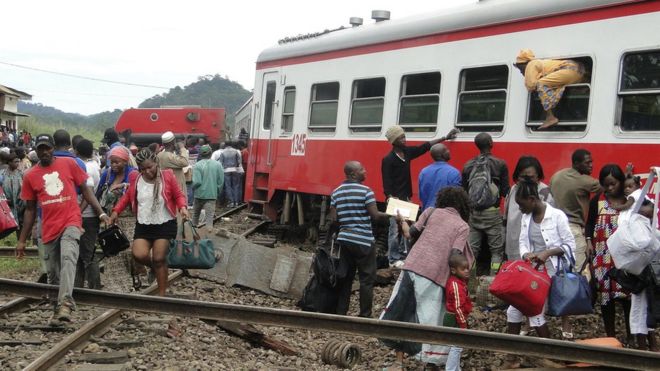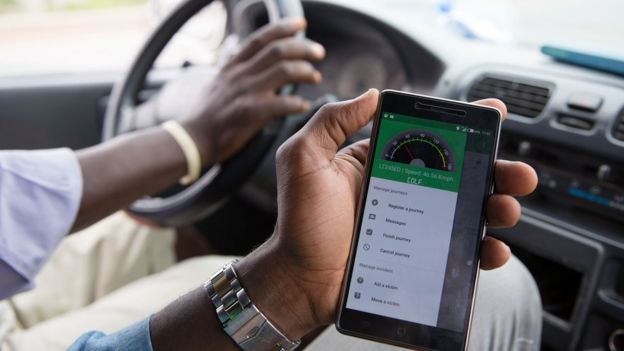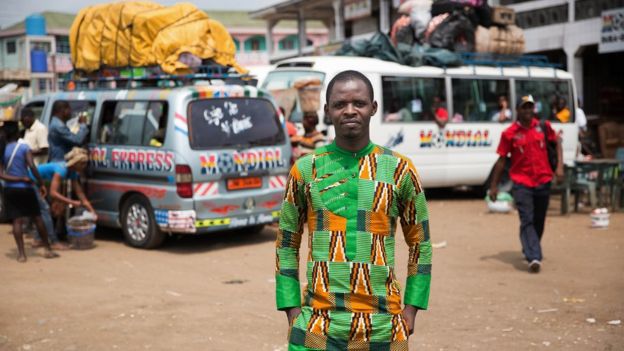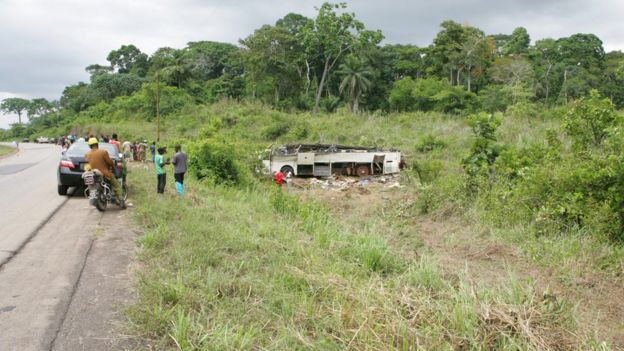How apps can ease Cameroon's road carnage
- 17 December 2016
- Africa
 GETTY IMAGES
GETTY IMAGES
More than 20,000 people died on Cameroon's roads between 2010 and 2015. According to the World Health Organization, road accidents cause 40% more fatalities than malaria in the country.
Its citizens are 10 times more likely to die while travelling than from the ongoing Boko Haram insurgency in the country.
An October train crash that killed 79 people crystallised the problem facing President Paul Biya's government and one local start-up hopes technology can transform the country's transport troubles.
Launched in October, the Traveler mobile application uses data, GPS and motion sensor technology to improve passenger safety and emergency responses.
"The problem has reached a breaking point," founder Achiri Arnold Nji says from his office in downtown Douala.
"There are too many accidents and an inability to control the drivers and to contact hospitals and families of victims - we hope our platform can change the situation."
Praying for a safe journey
A lack of transport infrastructure means speeding and overcrowding are commonplace while many drivers operate without full licences.
Mr Nji, 27, an electrical engineering graduate, says inspiration comes from personal experiences of the dangers on Cameroon's roads.
"Like most Cameroonians I am from a very big family. We have more than 28 cousins and I think about 23 of them have been involved in an accident," he says.
"As recent as 23 August my cousin was in an accident and she had a spine problem and spent around one week in the hospital.
"It is a thing we all know that when you get into a bus you pray, you hope that God helps you during your journey."
 TRAVELER
TRAVELER
Traveler's in-built GPS and sensor technology monitors driver speeds and users can report passenger overcrowding, road issues and traffic incidents to a central database.
It could be of particular value to bus travel. As recently as April, a deadly bus accident on the two-lane national highway left more than 70 people dead - officials cited overcrowding and excessive speed as causes.
When starting a journey, bus passengers enter the company name, vehicle number plate and destination and if an accident occurs, Traveler automatically alerts authorities.
Mr Nji explains: "If one person puts 'accident' in the system via the app or an SMS text, it will notify all emergency contacts of people travelling on the same bus and the message also automatically alerts hospitals of their location."
The application can also improve driver quality.
The developers of Traveller intend to provide transport operators with black boxes to be installed on buses to track them.
This will also enable them to monitor specific routes as well as the drivers' performance.
Transport operators to blame?
Bus drivers in Cameroon are poorly paid; workers from the company Le Bus went on strike over outstanding pay in November.
Martial Missimikim, who is the head of safety organisation Securoute agrees that roads need to be made less dangerous.
"They [transport companies] are asking drivers to go very fast and make many journeys to make money," says Mr Missimikim.
"They drive in the night and they overload and it is a very dangerous activity," he adds.
Mr Nji believes that if people had access to the application before the 22 October train crash, which killed 79 and left more than 600 injured, its impact would have been reduced.
Maintenance problems on the Yaounde-Douala highway, a 229km (142 miles) route linking Cameroon's capital and economic centre, had forced many people to travel by train around the time of the October rail accident.
 TRAVELER
TRAVELER
As Traveler allows users to report road-related problems to authorities, Mr Nji maintains overcrowding on trains - which had been the case on the doomed train - could have been reduced if roads had been repaired.
"Before the train accident there was an issue with the Yaounde-Douala road and no-one reported it," he says. "The road collapsed at a certain point and so many people were forced to take the train."
Many are unaware of emergency contacts and resources are limited.
The Yaounde General Hospital has only two ambulances and accidents and deaths can often go unreported - something that Mr Nji hopes Traveller, which is free and available on Android devices, can change.
"No-one keeps the emergency numbers of hospital and if you call them, maybe they will say there is a lack of petrol and they will not come," he says.
"But in a bus maybe 50% of passengers have Android phones and we think they can make a difference in the case of an accident."
Take me home safely
Similar technologies are also being employed to address the country's transport challenges.
One of them is Taxi Vairified, which provides an Uber-like service aimed at improving the standard of driving, as well as regulating the transport industry.
Its founder Patrick Ehode has teamed up with the government and beverage giant Guinness to launch a new road safety initiative in the city.
I caught up with him at the Guinness Diageo processing plant in Douala after the "Take Me Home" project was launched on 1 December.
The project started with a fleet of 50 Taxi Vairified cars stationed outside bars and restaurants to take people home as a way of raising awareness about drink driving.
"You can see that the environment for taxis is not well. We have a lot of people doing the job that [they] are not supposed to," Mr Ehode says.
"[We want] to ensure that people after a night out are getting home safely," he adds.
Government intervention
Road accidents cost Cameroon around $200m (£160m) a year, roughly 1% of its GDP. This has compelled the government to act.
One such intervention carried out by the police force is Operation Check-Monitor-Punish where vehicles are inspected. This has also seen an increase in speed-monitoring devices across the country.
 GETTY IMAGES
GETTY IMAGES
In October, the World Bank announced a $192m (£154m) loan to fund the country's Transport Sector Development project which is expected to improve transport efficiency and safety on the highway between Yaounde and the north-western city of Bamenda.
But concerns have been expressed over the lack of progress of a 2011 National Road Safety Strategy and Action Plan launched by government.
"There is a lack of coordination and no clear framework for road safety in Cameroon at this time," says Securoute's Mr Missimikim.
"Meanwhile there is no special education programme in schools to encourage road safety," he adds.
Traveler has gained recognition from the Africa Entrepreneurship Award and the Siemens Siftung competition this year. Developers of the app are currently in dialogue with government and transport operators in order to implement the application across Cameroon.
A call for support
A digital economy development plan was launched in 2015 and Telecommunications Minister Libo Li Likeng believes young entrepreneurs can help address institutional difficulties.
"Young people can more easily use ICT to solve the problems of our country," Ms Likeng tells me from her office in Yaounde.
"If ministers really listen to what they [young people] are doing we can really improve our way of working and solving our problems. It is a matter of changing mindsets and we are working on it," she adds.
Such technology start-ups often run into problems in Africa due to inadequate support but Mr Nji is confident that if government institutions and driver embrace the technology, Traveller will truly transform commuting in Cameroon.
"We hope the government can rise up to the occasion and assist us," he pleads. "We want to see change in the system. We are trying to make a difference."
No comments:
Post a Comment